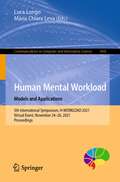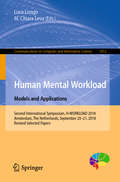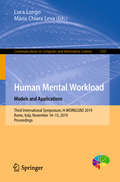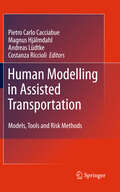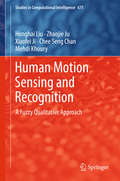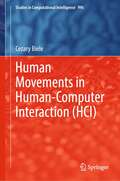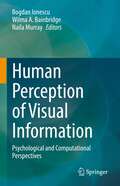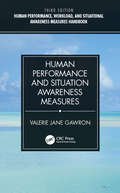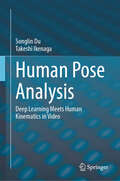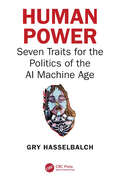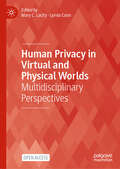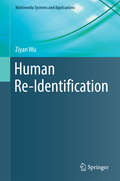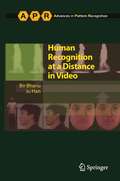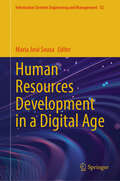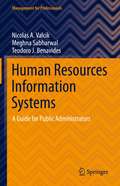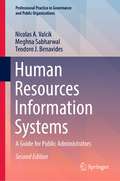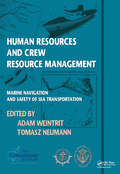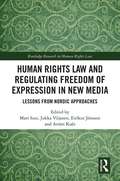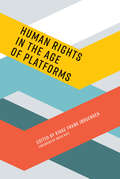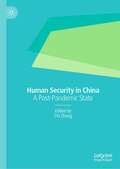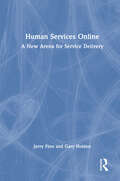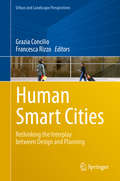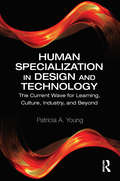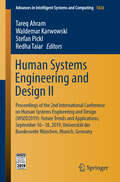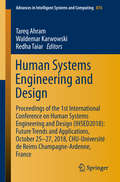- Table View
- List View
Human Mental Workload: 5th International Symposium, H-WORKLOAD 2021, Virtual Event, November 24–26, 2021, Proceedings (Communications in Computer and Information Science #1493)
by Luca Longo Maria Chiara LevaThis book constitutes the refereed proceedings of the 5th International Symposium on Human Mental Workload: Models and Applications, H-WORKLOAD 2021, held virtually in November 2021.The volume presents 9 revised full papers, which were carefully reviewed and selected from 16 submissions. The papers are organized in two topical sections on models and applications.
Human Mental Workload: Second International Symposium, H-WORKLOAD 2018, Amsterdam, The Netherlands, September 20-21, 2018, Revised Selected Papers (Communications in Computer and Information Science #1012)
by Luca Longo M. Chiara LevaThis book constitutes the refereed proceedings of the Second International Symposium on Human Mental Workload: Models and Applications, H-WORKLOAD 2018, held in Amsterdam, The Netherlands, in September 2018. The 15 revised full papers presented together with one keynote were carefully reviewed and selected from 31 submissions. The papers are organized in two topical sections on models and applications.
Human Mental Workload: Third International Symposium, H-WORKLOAD 2019, Rome, Italy, November 14–15, 2019, Proceedings (Communications in Computer and Information Science #1107)
by Luca Longo Maria Chiara LevaThis book constitutes the refereed proceedings of the Third International Symposium on Human Mental Workload: Models and Applications, H-WORKLOAD 2019, held in Rome, Italy, in November 2019.The volume presents one keynote paper as well as 14 revised full papers, which were carefully reviewed and selected from 32 submissions. The papers are organized in two topical sections on models and applications.
Human Modelling in Assisted Transportation
by Carlo Cacciabue Magnus Hjälmdahl Costanza Riccioli Andreas LuedtkeThe objective of this Workshop is to confront models, methods and tools developed within the projects with the ongoing research worldwide and to provide an environment for fruitful exchange of ideas. The main topics are: 1. Advanced human models in transportation. 2. Human Errors and Risk Assessment in design processes of assistance systems. 3. Methods and tools to prevent erroneous behaviour to mitigate its consequences. The Workshop will consist of 10 keynote lectures as well as approximately 28 peer reviewed papers.
Human Motion Sensing and Recognition: A Fuzzy Qualitative Approach (Studies in Computational Intelligence #675)
by Honghai Liu Zhaojie Ju Xiaofei Ji Chee Seng Chan Mehdi KhouryThis book introduces readers to the latest exciting advances in human motion sensing and recognition, from the theoretical development of fuzzy approaches to their applications. The topics covered include human motion recognition in 2D and 3D, hand motion analysis with contact sensors, and vision-based view-invariant motion recognition, especially from the perspective of Fuzzy Qualitative techniques.With the rapid development of technologies in microelectronics, computers, networks, and robotics over the last decade, increasing attention has been focused on human motion sensing and recognition in many emerging and active disciplines where human motions need to be automatically tracked, analyzed or understood, such as smart surveillance, intelligent human-computer interaction, robot motion learning, and interactive gaming. Current challenges mainly stem from the dynamic environment, data multi-modality, uncertain sensory information, and real-time issues.These techniques are shown to effectively address the above challenges by bridging the gap between symbolic cognitive functions and numerical sensing & control tasks in intelligent systems. The book not only serves as a valuable reference source for researchers and professionals in the fields of computer vision and robotics, but will also benefit practitioners and graduates/postgraduates seeking advanced information on fuzzy techniques and their applications in motion analysis.
Human Movements in Human-Computer Interaction (Studies in Computational Intelligence #996)
by Cezary BieleThis book discusses human–computer interaction (HCI) which is a multidisciplinary field of study which aims at developing and implementing tools and techniques to attain an effective and efficient interaction between the humans (the users) and computers. In recent years, there is an increase of interest of HCI researchers and practitioners in the inclusion of gaze gestures which can greatly enhance the communication between the human user and the computer, as well as other more “physical” communication involving all what can be learned from movements of the human body, from face, hand, leg, foot, etc., to the whole body movement, even extending to the involvement of groups of agents, even society. These explicitly human-centric issues in the development, design, analysis, and implementation of the HCI systems are discussed in the book. A comprehensive state of the art is given complemented with original own proposals. As opposed to more traditional formal and IT based analyses, the discussion is here more focused on relevant research results from psychology and psychophysiology, and other soft, cognitive, etc., sciences. Remarks on the relevance of affective computing are also mentioned.
Human Perception of Visual Information: Psychological and Computational Perspectives
by Bogdan Ionescu Wilma A. Bainbridge Naila MurrayRecent years have witnessed important advancements in our understanding of the psychological underpinnings of subjective properties of visual information, such as aesthetics, memorability, or induced emotions. Concurrently, computational models of objective visual properties such as semantic labelling and geometric relationships have made significant breakthroughs using the latest achievements in machine learning and large-scale data collection. There has also been limited but important work exploiting these breakthroughs to improve computational modelling of subjective visual properties. The time is ripe to explore how advances in both of these fields of study can be mutually enriching and lead to further progress.This book combines perspectives from psychology and machine learning to showcase a new, unified understanding of how images and videos influence high-level visual perception - particularly interestingness, affective values and emotions, aesthetic values, memorability, novelty, complexity, visual composition and stylistic attributes, and creativity. These human-based metrics are interesting for a very broad range of current applications, ranging from content retrieval and search, storytelling, to targeted advertising, education and learning, and content filtering.Work already exists in the literature that studies the psychological aspects of these notions or investigates potential correlations between two or more of these human concepts. Attempts at building computational models capable of predicting such notions can also be found, using state-of-the-art machine learning techniques. Nevertheless their performance proves that there is still room for improvement, as the tasks are by nature highly challenging and multifaceted, requiring thought on both the psychological implications of the human concepts, as well as their translation to machines.
Human Performance and Situation Awareness Measures
by Valerie GawronThis book was developed to help researchers and practitioners select measures to be used in the evaluation of human/machine systems. The book begins with an overview of the steps involved in developing a test to measure human performance. This is followed by a definition of human performance and a review of human performance measures. Another section defines situational awareness with reviews of situational awareness measures. For both the performance and situational awareness sections, each measure is described, along with its strengths and limitations, data requirements, threshold values, and sources of further information. To make this reference easier to use, extensive author and subject indices are provided. <P><P>Features <li>Provides a short engineering tutorial on experimental design <li>Offers readily accessible information on human performance and situational awareness (SA) measures <li>Presents general description of the measure <li>Covers data collection, reduction, and analysis requirements <li>Details the strengths and limitations or restrictions of each measure, including proprietary rights or restrictions
Human Pose Analysis: Deep Learning Meets Human Kinematics in Video
by Songlin Du Takeshi IkenagaThis book stands at the intersection of computer vision, artificial intelligence, and human kinematics, offering a comprehensive exploration of the principles, methodologies, and applications of human pose analysis in video data. It covers two main aspects: human body pose analysis and human head pose analysis. Human body pose analysis involves estimating the position and orientation of major joints and body parts, such as the head, neck, shoulders, elbows, wrists, hips, knees, and ankles, to capture the entire body posture in 2D or 3D space. In contrast, human head pose analysis focuses solely on the head’s orientation, typically estimating the angles of rotation around the yaw, pitch, and roll axes to determine the direction in which a person is looking or tilting their head. The book is divided into three parts, each detailing recent research in different areas of pose analysis. The first chapter provides an overview of human body and head pose analysis, including the fundamental principles of kinematic representation, as well as commonly used datasets and evaluation metrics. The first part, consisting of Chapters 2 and 3, delves into 2D human body pose analysis. The second part, spanning Chapters 4 through 7, covers the latest advancements in 3D human body pose estimation, focusing on inferring 3D positions and orientations of body joints from 2D images or videos. The third part, covering Chapters 8 and 9, presents recent studies on 3D human head pose analysis, encompassing both 3D head pose estimation and prediction. The final chapter concludes by summarizing the techniques discussed and outlining future research directions and applications in human body and head pose analysis.
Human Power: Seven Traits for the Politics of the AI Machine Age
by Gry HasselbalchThe rapid and tumultuous technological transformation of our societies has triggered a self-exploratory public debate about what it means to be human. What are our human potential, talents, and powers – what, essentially, is our place in the modern world? Will a culture of machines out-compete a culture of humanity?In this thought-provoking but ultimately hopeful book, scholar and leading technology critic Gry Hasselbalch invites readers to reflect on the shifting dynamics between humans and the AI-powered technologies increasingly shaping our world. Exploring the distinctiveness of human power, the book addresses current debates about technology that portray humans as powerless and flawed – in essence outdated software in dire need of a technological fix – arguing that human power must remain central in discussions about AI and technology. It investigates seven key traits which set humans apart from machines: Creativity, Intuition, Emotion, Life, Defiance, Love, and Wisdom. Drawing on interviews and examples from across arts – including literature, visual arts, film and music – and from technology politics and policymaking, Human Power explains how these traits provide a foundation for a new politics in the AI Machine Age. One that does not diminish and reduce human power, but actively protects and reinforces it.If human power is not a computational process, then what is it? Human Power: Seven Traits for the Politics of the AI Machine Age gives human power – our humanity and fundamental “humanness” – a renewed voice in a debate dominated by fears and preconceptions about technological power. This important new work will appeal to journalists, policymakers, artists, and educators—and anyone else interested in the rapidly growing role of AI and digital technology in our lives.
Human Privacy in Virtual and Physical Worlds: Multidisciplinary Perspectives (Technology, Work and Globalization)
by Mary C. Lacity Lynda CoonThis open-access book is premised on the belief that understanding and protecting privacy requires a multidisciplinary approach. The editors of this contributed book believe that privacy is a ‘wicked problem’ because of its social complexity. In the modern world, political, social, and technological structures increasingly violate human privacy in physical and virtual spaces. Our behaviors are surveilled, captured, and monetized—often without our knowledge. Contributors are experts from diverse fields, including anthropology, architecture, data science, engineering, history, information systems, library sciences, medicine, philosophy, and supply chain management, each writing for an explicitly interdisciplinary readership. Privacy as a concept is a moving target across the globe, morphing and transforming historically from one epoch to the next. By moving beyond the limitations of a single disciplinary lens, this book aims at a richer, more comprehensive, and more lasting analysis. This collection is of great interest to students and scholars of diverse backgrounds studying human privacy.
Human Re-Identification
by Ziyan WuThis book covers aspects of human re-identification problems related to computer vision and machine learning. Working from a practical perspective, it introduces novel algorithms and designs for human re-identification that bridge the gap between research and reality. The primary focus is on building a robust, reliable, distributed and scalable smart surveillance system that can be deployed in real-world scenarios. This book also includes detailed discussions on pedestrian candidates detection, discriminative feature extraction and selection, dimension reduction, distance/metric learning, and decision/ranking enhancement. This book is intended for professionals and researchers working in computer vision and machine learning. Advanced-level students of computer science will also find the content valuable.
Human Recognition at a Distance in Video
by Bir Bhanu Ju HanMost biometric systems employed for human recognition require physical contact with, or close proximity to, a cooperative subject. Far more challenging is the ability to reliably recognize individuals at a distance, when viewed from an arbitrary angle under real-world environmental conditions. Gait and face data are the two biometrics that can be most easily captured from a distance using a video camera. This comprehensive and logically organized text/reference addresses the fundamental problems associated with gait and face-based human recognition, from color and infrared video data that are acquired from a distance. It examines both model-free and model-based approaches to gait-based human recognition, including newly developed techniques where the both the model and the data (obtained from multiple cameras) are in 3D. In addition, the work considers new video-based techniques for face profile recognition, and for the super-resolution of facial imagery obtained at different angles. Finally, the book investigates integrated systems that detect and fuse both gait and face biometrics from video data. Topics and features: discusses a framework for human gait analysis based on Gait Energy Image, a spatio-temporal gait representation; evaluates the discriminating power of model-based gait features using Bayesian statistical analysis; examines methods for human recognition using 3D gait biometrics, and for moving-human detection using both color and thermal image sequences; describes approaches for the integration face profile and gait biometrics, and for super-resolution of frontal and side-view face images; introduces an objective non-reference quality evaluation algorithm for super-resolved images; presents performance comparisons between different biometrics and different fusion methods for integrating gait and super-resolved face from video. This unique and authoritative text is an invaluable resource for researchers and graduate students of computer vision, pattern recognition and biometrics. The book will also be of great interest to professional engineers of biometric systems.
Human Resources Development in a Digital Age (Information Systems Engineering and Management #52)
by Maria José SousaThis book leads to a transformative journey through the world of human resources development (HRD) in the digital age, where technology and innovation converge to redefine the workplace. It unveils the dynamic shifts driven by artificial intelligence (AI), data analytics, and immersive technologies, offering a roadmap to harness these advancements for organizational success. This comprehensive exploration examines the critical aspects of HRD, including learning and development, engagement, competencies, organizational culture, and other important topics. Through engaging insights and real-world examples, the book highlights how AI personalizes learning experiences and enhances decision-making processes. It also addresses the ethical considerations of adopting digital tools, emphasizing data privacy, fairness, and the human element in technology-driven strategies. From overcoming the digital divide to fostering a culture of continuous learning, this book equips readers with the knowledge to navigate challenges and seize opportunities in a rapidly evolving landscape. This book is an essential resource for HR professionals, organizational leaders, professors and students, and anyone seeking to future-proof their workforce and drive sustainable growth. It redefines the HR strategy and embraces the limitless potential of digital transformation with this groundbreaking book.
Human Resources Information Systems: A Guide for Public Administrators (Management for Professionals)
by Nicolas A. Valcik Meghna Sabharwal Teodoro J. BenavidesThis book provides an introduction to Human Resource Information Systems (HRIS) for those in the public administration field. At the intersection between human resource management and information technology, HRIS is often the key to having and maintaining the personnel data that is essential for hiring and recruitment, strategic planning and analysis, and legal requirements in most public organizations. This book describes what an HRIS system is, what the functionality of such a system should be, and outlines the practical aspects of an HRIS. It also compares the different aspects of human resources in public organizations, non-profit organizations, and private corporations, and how differences across organizations may influence the functionality requirements of the HRIS. Finally, the volume contains both an organizational theory component, which frames how an HRIS interacts with an organization both from a functional standpoint and a reporting standpoint. The book includes a practical component, which includes real-world case studies that illustrate the advantages and pitfalls to implementing an HRIS enterprise system. Providing a thorough introduction to HRIS for both academics and practitioners, this volume is appropriate for researchers, graduate students, and practitioners in the fields of public administration, higher education administration, information systems, computer science, and human resources.
Human Resources Information Systems: A Guide for Public Administrators (Professional Practice in Governance and Public Organizations)
by Nicolas A. Valcik Meghna Sabharwal Teodoro J. BenavidesThis volume provides an introduction to Human Resource Information Systems (HRIS) for those in the public administration field. At the intersection between human resource management and information technology, HRIS is often the key to having and maintaining the personnel data that is essential for hiring and recruitment, strategic planning and analysis, and legal requirements in most public organizations. Revised and updated for the second edition, this book describes what an HRIS system is, what the functionality of such a system should be, and outlines the practical aspects of an HRIS. It also compares the different aspects of human resources in public organizations, non-profit organizations, and private corporations, and how differences across organizations may influence the functionality requirements of the HRIS. Finally, the volume contains both an organizational theory component, which frames how an HRIS interacts with an organization both from a functional standpoint and a reporting standpoint. The book includes a practical component, which includes real-world case studies that illustrate the advantages and pitfalls to implementing an HRIS enterprise system. Providing a thorough introduction to HRIS for both academics and practitioners, this volume is appropriate for researchers, graduate students, and practitioners in the fields of public administration, higher education administration, information systems, computer science, and human resources.
Human Resources and Crew Resource Management: Marine Navigation and Safety of Sea Transportation
by Adam Weintrit Tomasz NeumannThe TransNav 2011 Symposium held at the Gdynia Maritime University, Poland in June 2011 has brought together a wide range of participants from all over the world. The program has offered a variety of contributions, allowing to look at many aspects of the navigational safety from various different points of view. Topics presented and discussed at the Symposium were: navigation, safety at sea, sea transportation, education of navigators and simulator-based training, sea traffic engineering, ship's manoeuvrability, integrated systems, electronic charts systems, satellite, radio-navigation and anti-collision systems and many others. This book is part of a series of six volumes and provides an overview of Human Resources and Crew Resource management and is addressed to scientists and professionals involved in research and development of navigation, safety of navigation and sea transportation.
Human Rights Law and Regulating Freedom of Expression in New Media: Lessons from Nordic Approaches (Routledge Research in Human Rights Law)
by Mart Susi Jukka Viljanen Eiríkur Jónsson Artūrs KučsThe Nordic countries are well known globally for their high human rights standards and, at the same time, high degree of internet freedom. This edited collection reveals how the Nordic countries have succeeded in the task of protecting freedom of expression in the new media. It contains an overview of public policy choices and best practices of domestic online companies, which have the aspiration of finding global acceptance. Reviewing the topic of freedom of expression in new media within Nordic and Baltic countries, this book incorporates both general themes and interesting country-specific themes that will provide wider knowledge on the development of freedom of expression and media law in the online media era. A comprehensive analysis of regulation of online media, both at the level of legislation and application of law in courts and other authorities, are included. This book will contribute to the ongoing discussion as to whether there is a need to modify prevailing interpretation of freedom of expression. Human Rights Law and Regulating Freedom of Expression in New Media focuses on the multi-layered and complicated relationship between internet and human rights law. It contributes to the ongoing discussion regarding the protection of freedom of expression on the internet in the context of various doctrines of constitutional law, including the proliferation of constitutional adjudication. It will be of interest to researchers, academics, policymakers, and students in the fields of human rights law, internet law, political science, sociology, cultural studies, media and communications studies and technology.
Human Rights in the Age of Platforms (Information Policy)
by Rikke Frank JørgensenScholars from across law and internet and media studies examine the human rights implications of today's platform society.Today such companies as Apple, Facebook, Google, Microsoft, and Twitter play an increasingly important role in how users form and express opinions, encounter information, debate, disagree, mobilize, and maintain their privacy. What are the human rights implications of an online domain managed by privately owned platforms? According to the Guiding Principles on Business and Human Rights, adopted by the UN Human Right Council in 2011, businesses have a responsibility to respect human rights and to carry out human rights due diligence. But this goal is dependent on the willingness of states to encode such norms into business regulations and of companies to comply. In this volume, contributors from across law and internet and media studies examine the state of human rights in today's platform society.The contributors consider the “datafication” of society, including the economic model of data extraction and the conceptualization of privacy. They examine online advertising, content moderation, corporate storytelling around human rights, and other platform practices. Finally, they discuss the relationship between human rights law and private actors, addressing such issues as private companies' human rights responsibilities and content regulation.ContributorsAnja Bechmann, Fernando Bermejo, Agnès Callamard, Mikkel Flyverbom, Rikke Frank Jørgensen, Molly K. Land, Tarlach McGonagle, Jens-Erik Mai, Joris van Hoboken, Glen Whelan, Jillian C. York, Shoshana Zuboff, Ethan ZuckermanOpen access edition published with generous support from Knowledge Unlatched and the Danish Council for Independent Research.
Human Security in China: A Post-Pandemic State
by Chi ZhangThis book explores the emergent concept of 'human security' within the political context of COVID-19 Chinese politics. For decades, Western nations have used 'human rights' as a rubric with which to scold Chinese leaders, betraying a fundamental unwillingness to accept diversity of governance systems. As COVID-19 has demonstrated, different governance systems yield different outcomes—the freedom of circulation, speech and movement in Western democracies yielding one, and use of surveillance, lockdowns, and private–public collaboration in China and Asian societies such as Korea and Singapore yielding another. Chinese political scientists have become fixated on the notion of 'human security,' a utilitarian concept which insists on the importance of protecting and extending human life via health care, technology, and a wide range of other systems—sometimes, in ways which contradict Western notions of human rights, even as they demonstrably achieve superior outcomes for the humans involved. Being the first English language book to explore these issues, this book aims to generate a sustained theoretical relevance in the aftermath of the crisis which is likely to have lasting effects on how people live and will be of note for political scientists, China scholars, and economists.
Human Services Online: A New Arena for Service Delivery
by Gary Holden Jerry FinnWill your agency or students have the training to use the Internet in practice?Human Services Online: A New Arena for Service Delivery focuses on ways that Human Services are using the Internet for service delivery, community education, collaboration, advocacy, social change, and resource development. This valuable book highlights the array of innovative services now being offered on the Internet and provides guidelines and cautions for human service professionals in using the Internet to enhance their services.Human Services Online: A New Arena for Service Delivery provides much-needed research and empirical evaluation related to human service online activities and points to areas where future research efforts should be directed. The book describes and evaluates cutting-edge Internet-based services, ethical and legal threats to agencies and consumers that may result from online activities, and theoretical discussions of issues that impact human services as consumers and human service agencies increasingly come online.Topics addressed in Human Services Online: A New Arena for Service Delivery include: online therapy/counseling online fundraising online recruitment of volunteers and virtual volunteer programs online consultation, continuing education, and training ethical, legal, and liability issues related to Web sites and online support online support groups and self-help online advocacy and activism promoting access for under-represented populations use of the Internet to impact specific social problems such as domestic violence or HIV/AIDS Human Services Online: A New Arena for Service Delivery provides guidelines and specific suggestions for agencies considering developing online services. The book examines model programs and their effectiveness so that other agencies can replicate them in their own areas, describes cutting-edge online services that today's human services students will need to be aware of as they enter the job market, and provides information for agencies that will enhance their ability to solicit volunteers and contributions on the Internet.
Human Smart Cities
by Grazia Concilio Francesca RizzoWithin the most recent discussion on smart cities and the way this vision is affecting urban changes and dynamics, this book explores the interplay between planning and design both at the level of the design and planning domains' theories and practices. Urban transformation is widely recognized as a complex phenomenon, rich in uncertainty. It is the unpredictable consequence of complex interplay between urban forces (both top-down or bottom-up), urban resources (spatial, social, economic and infrastructural as well as political or cognitive) and transformation opportunities (endogenous or exogenous). The recent attention to Urban Living Lab and Smart City initiatives is disclosing a promising bridge between the micro-scale environments, with the dynamics of such forces and resources, and the urban governance mechanisms. This bridge is represented by those urban collaborative environments, where processes of smart service co-design take place through dialogic interaction with and among citizens within a situated and cultural-specific frame.
Human Specialization in Design and Technology: The Current Wave for Learning, Culture, Industry, and Beyond
by Patricia A. YoungHuman Specialization in Design and Technology explores emerging trends in learning and training—standardization, personalization, customization, and specialization—with a unique focus on innovations specific to human needs and conditions. Analyzing evidence from current academic research as well as the popular press, this concise volume defines and examines the trajectory of instructional design and technologies toward more human-centered and specialized products, services, processes, environments, and systems. Examples from education, healthcare, business, and other sectors offer real-world demonstrations for scholars and graduate students of educational technology, instructional design, and business development. The book features insights into the future of professors, public schools, equity and access, extended technologies, open educational resources, and more, concluding with a set of concrete solutions.
Human Systems Engineering and Design II: Proceedings of the 2nd International Conference on Human Systems Engineering and Design (IHSED2019): Future Trends and Applications, September 16-18, 2019, Universität der Bundeswehr München, Munich, Germany (Advances in Intelligent Systems and Computing #1026)
by Stefan Pickl Waldemar Karwowski Tareq Ahram Redha TaiarThis book focuses on novel design and systems engineering approaches, including theories and best practices, for promoting a better integration of people and engineering systems. It covers a range of hot topics related to: development of human-centered systems; interface design and human-computer interaction; usability and user experience; emergent properties of human behavior; innovative materials in manufacturing, biomechanics, and sports medicine, safety engineering and systems complexity business analytics, design and technology and many more. The book, which gathers selected papers presented at the 2nd International Conference on Human Systems Engineering and Design: Future Trends and Applications (IHSED 2019), held on September 16-18, 2019, at Universität der Bundeswehr München, Munich, Germany, provides researchers, practitioners and program managers with a snapshot of the state-of-the-art and current challenges in the field of human systems engineering and design.
Human Systems Engineering and Design: Proceedings of the 1st International Conference on Human Systems Engineering and Design (IHSED2018): Future Trends and Applications, October 25-27, 2018, CHU-Université de Reims Champagne-Ardenne, France (Advances in Intelligent Systems and Computing #876)
by Waldemar Karwowski Tareq Ahram Redha TaiarThis book focuses on novel design and systems engineering approaches, including theories and best practices, for promoting a better integration of people and engineering systems. It covers a range of hot topics related to: development of activity-centered and user-centered systems; interface design and human-computer interaction; usability and user experience; cooperative, participatory and contextual models; emergent properties of human behavior; innovative materials in manufacturing, and many more. Particular emphasis is placed on applications in sports, healthcare, and medicine. The book, which gathers selected papers presented at the 1st International Conference on Human Systems Engineering and Design: Future Trends and Applications (IHSED 2018), held on October 25-27, 2018, at CHU-Université de Reims Champagne-Ardenne, France, provides researchers, practitioners and program managers with a snapshot of the state-of-the-art and current challenges in the field of human systems engineering and design.
